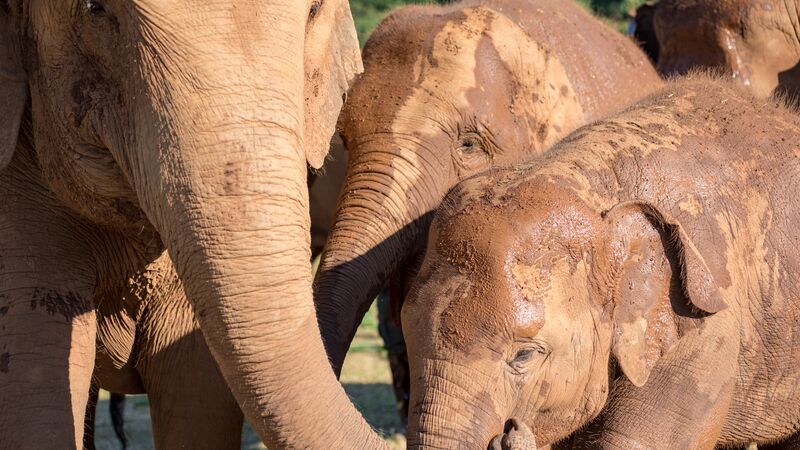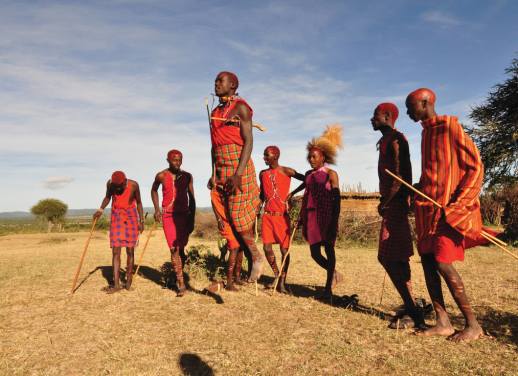For over twenty years, we used to ride elephants for fun. Intrepid was part of what became known as ‘elephant tourism’ – a multi-million-dollar industry in southeast Asian countries, particularly Thailand.
Elephants have been broken-in and used for manual labour for thousands of years. But in 1989, after logging was banned in Thailand, local elephant trainers (also known as mahouts) turned their talents to tourism. Thanks to big global tour companies, like Intrepid, elephant riding quickly became very popular and very lucrative. There was this widespread belief in the travel industry, among tourists and operators, that breaking-in elephants was somehow okay. That they were domesticated animals.
It’s important to look back and own this practice, especially as we’re celebrating World Elephant Day. It happened. We were part of the problem. Thankfully, we were also part of the solution.
The end of elephant rides
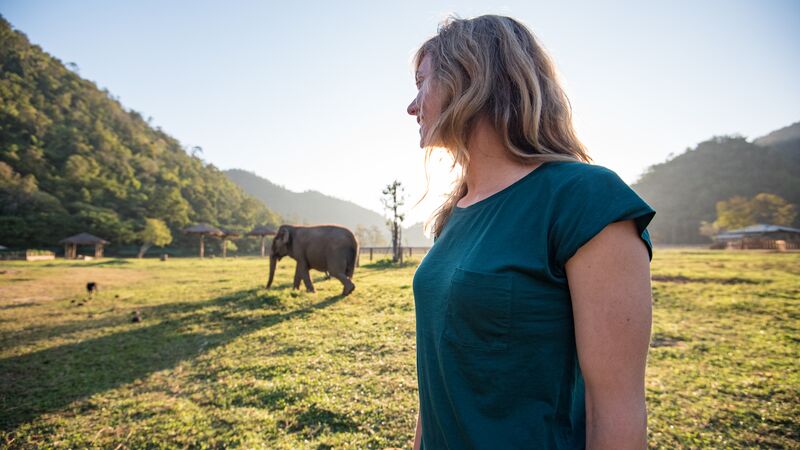
We used to make a lot of money riding elephants.
In 2010, we partnered with World Animal Protection, a global not-for-profit animal welfare group, to support one of the first studies into elephant conditions on the ground. The study looked at 118 venues all over South East Asia. The results revealed that elephants were suffering for our enjoyment.
By 2014, we had removed elephant rides on all our trips. It was an industry-shaking move at the time. Intrepid was the first global travel company to take this stance, but happily, we weren’t the last. Since then, over 200 travel companies around the world, including heavyweights like TripAdvisor, have followed our lead and removed elephant riding from their itineraries.
RELATED: THIS IS WHY WE NO LONGER RIDE ELEPHANTS
Matt’s story
Matt Freer works for Intrepid. In April 2004, he and three friends visited Thailand and joined an elephant riding tour. He was 22 at the time. We sat down with Matt and asked him about his experience: why he chose to ride an elephant, what it was like, and how he feels about it now. This is his story:
Sitting on top of the elephant’s head, our guide started to direct the animal by hitting it with a wooden stick and yanking vigorously on the large butcher’s hooks torn through both of its ears. Sitting further back on a crude metal basket fastened to the elephant’s back, I looked across at my friend. We both realised we had made a terrible mistake.
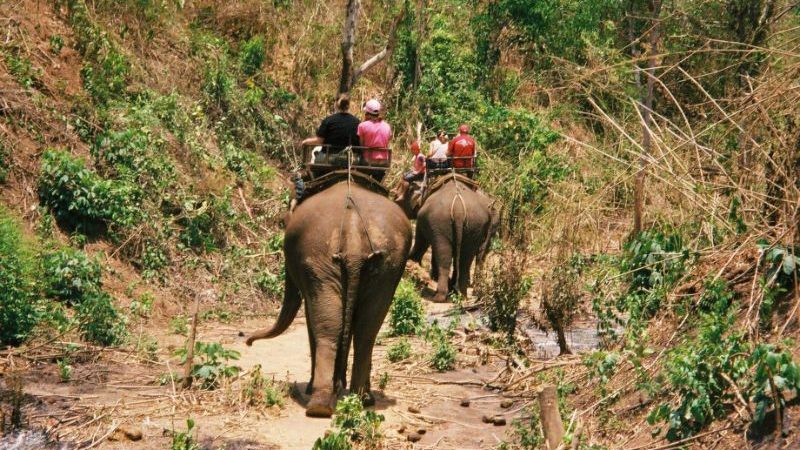
Two of Matt’s friends on an elephant.
I was on my gap year. A fresh-faced 22-year-old, newly graduated from university, and wanting to see the world before settling into the nine-to-five office grind. My three friends and I had spent the last few months meticulously planning our six-month round-the-world trip. We’d be bungee jumping in New Zealand, scuba diving in Fiji, and surfing in California. Animal cruelty in Thailand wasn’t on the list.
So how did we end up here? Were we tricked into riding an elephant? Were we bundled into a minivan and forced to ride through the jungle? Sadly, no one made us ride an elephant. It was something we chose to do.
WE USED TO MAKE A LOT OF MONEY RIDING ELEPHANTS
We’d seen an ad at the reception of our hostel in Chiang Mai: “Elephant Trekking In The Thai Jungle”. It sounded fun and interesting and the kind of thing you do when you’re in Thailand. We’d grown up seeing elephant riding in circuses and the movies (think Indiana Jones and the Temple of Doom). I’d never really questioned the whole practice. I guess, if pushed, I thought of it as a localised version of horse riding.
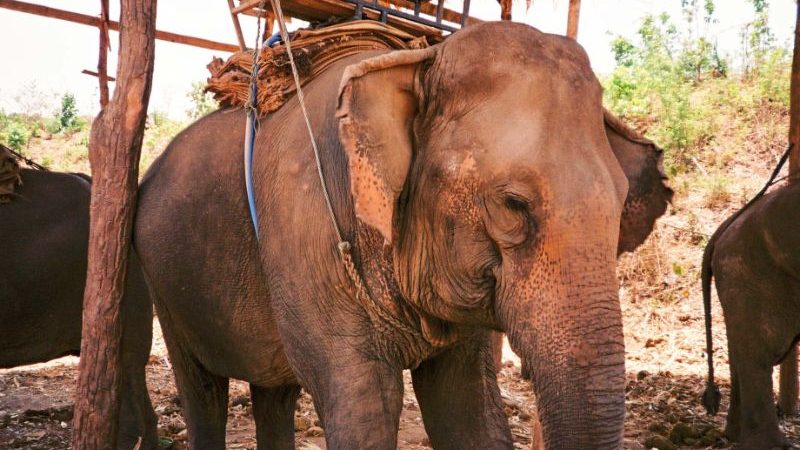
One of the animals on Matt’s ill-fated Thailand trip.
Even when we saw the elephants before our trek, chained up under a makeshift shade, it still didn’t click that this was not the experience we thought it was going to be. Not until we were sitting atop the elephant and the guides started hitting it with sticks and yanking hooks, did it dawn on us that this was not going to be a fun travel memory.
After this realization, the trek seemed to go on forever, as this poor animal had to negotiate difficult rocky terrain while two tourists sat on its back and a small man assaulted its face. After the trek, we returned to our hostel feeling pretty disgusted with ourselves, and shocked at our naivety.
Looking back now, I still can’t believe how stupid we were for not questioning elephant riding; for willfully putting our names down to participate in it. It’s so obvious that a wild animal shouldn’t be trained to give tourists joy rides around a park. I can’t excuse my behavior; it was a lazy choice made without much thought, and that’s probably the problem. We all have the responsibility as travellers to make sure our choices are considered and thought out. By simply doing the necessary research, we can make a stand and say, “No, that’s not OK, I’m not doing that.” We can force these kinds of practices to shut down.
The next step
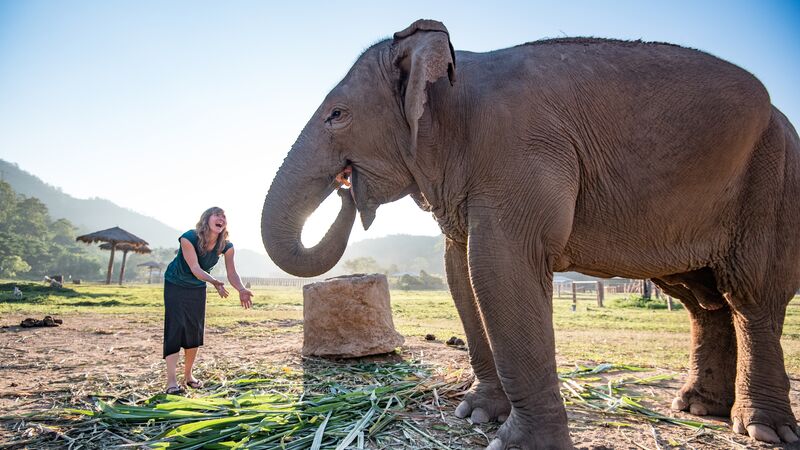
Meeting one of the locals at Thailand’s Elephant Nature Park.
It’s been five years since we stopped riding elephants, but there’s still a lot of work to be done. There are only 40,000 Asian elephants left in the wild, and more than half of Thailand’s 7,000 elephants still live in captivity, with tourism the number one culprit. Travellers are in a unique position to change this – without the demand for elephant rides, local operators have no incentive to keep the practice going.
RELATED: HOW WE CHANGED THE ELEPHANT RIDING INDUSTRY
Instead, look for ethical alternatives, where you can learn about Asian elephants at facilities that actively promote their welfare. Our not-for-profit, The Intrepid Foundation, supports two of them: Friends Of The Asian Elephant, a conservation projects that rehabilitates elephants injured while working in the tourism industry, and MandaLao Elephant Conservation, a sanctuary in Laos promoting ethical elephant care while creating jobs for locals.
But the first step is owning our past. Doing something unethical is bad, but it’s not the real problem. The real problem is being oblivious and not learning from your mistakes.
Want to learn more about Intrepid’s animal welfare policies? Find out more about our stance on animal welfare here.

